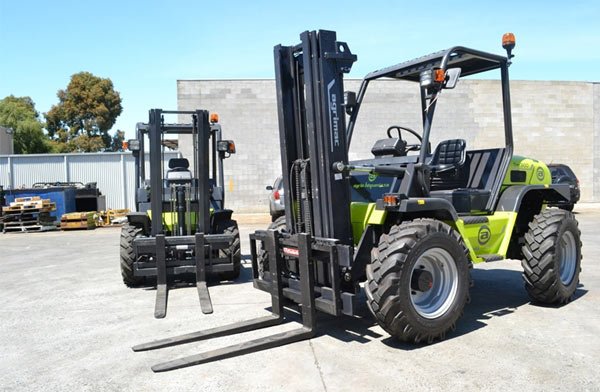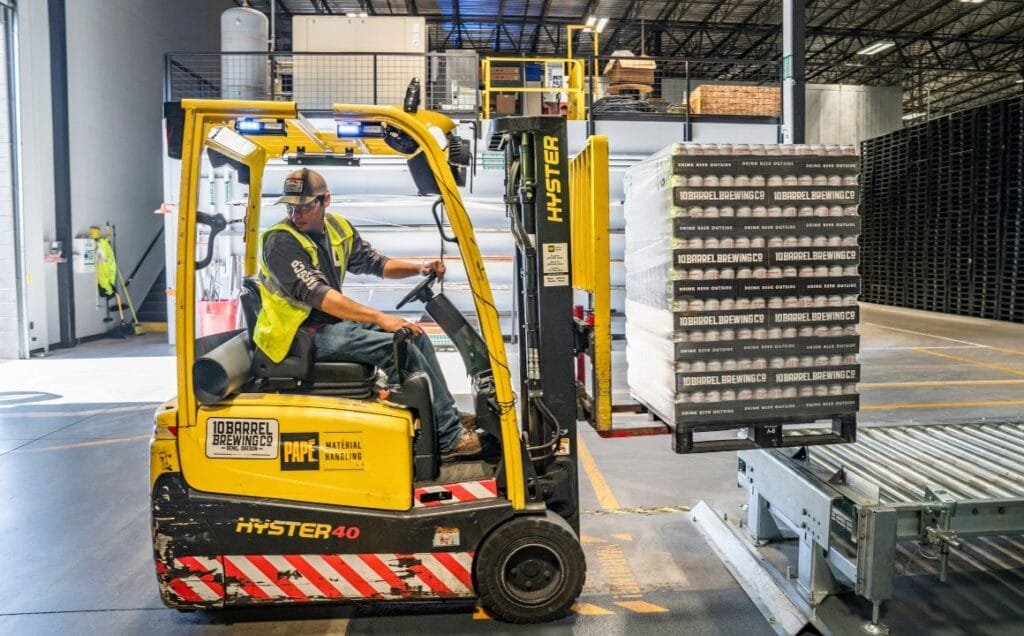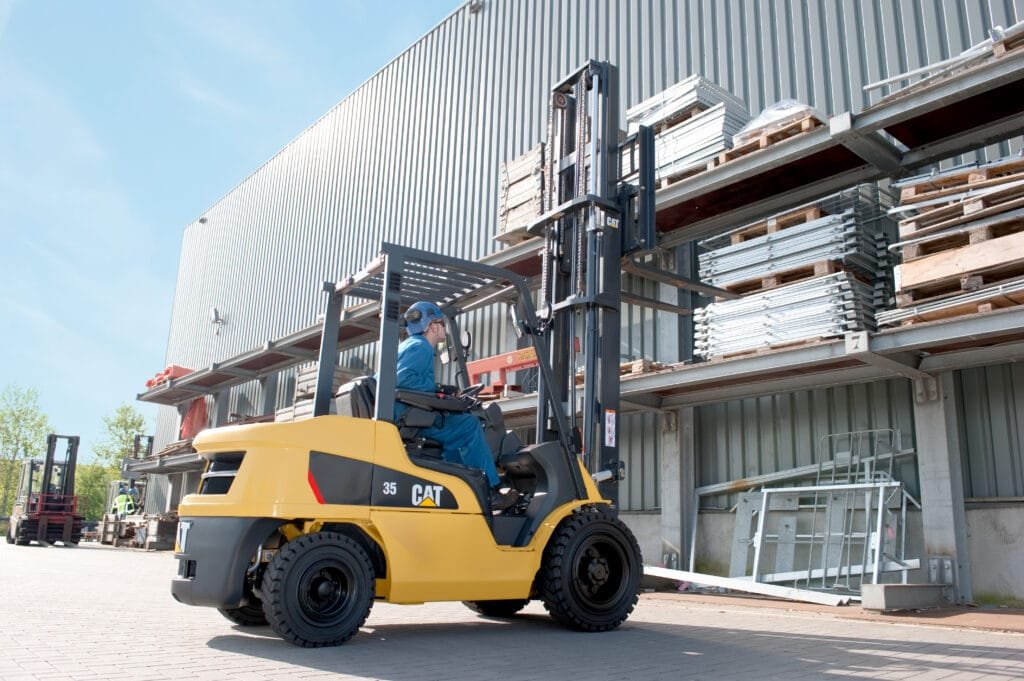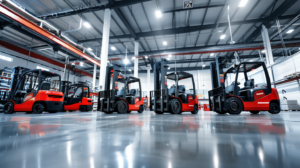Forklifts are essential pieces of equipment in various industries, from warehouses and construction sites to manufacturing plants. Given their importance, the demand for forklifts has led to a growing market for forklift rentals. However, like any business venture, forklift rental services come with their unique challenges and opportunities. If you’re considering entering this business, you might be asking, “Is forklift rentals a good business?”
In this comprehensive guide, we’ll explore the forklift rental business, including the market demand, profitability, startup costs, and potential challenges. By the end, you’ll have a clearer picture of whether or not forklift rentals could be a profitable and sustainable business option.

1. Introduction to Forklift Rentals
What Is Forklift Rental?
Forklift rental is the business of leasing forklifts to companies for short-term or long-term use. These forklifts are used primarily in industries that require heavy lifting, such as warehouses, distribution centers, construction sites, and manufacturing plants. Rental services allow businesses to access high-quality forklifts without the need for large upfront capital or long-term commitments.
Why Forklift Rentals Are Popular
Forklift rentals have gained popularity for several reasons:
- Cost-Effectiveness: Renting allows businesses to avoid the significant upfront investment of purchasing forklifts.
- Flexibility: Renting provides businesses with the flexibility to scale operations without long-term commitments.
- Maintenance-Free: Most rental agreements include maintenance, meaning businesses don’t have to worry about upkeep and repairs.
- Access to Latest Technology: Renting allows companies to access the latest forklift models without worrying about depreciation.
2. Market Demand for Forklift Rentals
Industries That Use Forklifts
Forklifts are versatile and are used across a variety of industries. The following are some of the most common sectors where forklifts are in high demand:
- Warehousing: Forklifts are essential for moving pallets and goods in large storage spaces.
- Construction: Construction sites often require forklifts to move building materials and equipment.
- Manufacturing: Forklifts are crucial for transporting raw materials and finished goods within manufacturing facilities.
- Retail: Large retail stores with expansive warehouses require forklifts for inventory management.
Growth of the Forklift Rental Market
The forklift rental market is expected to grow significantly in the coming years, driven by the increasing demand for material handling equipment in industries such as logistics, manufacturing, and retail. The global forklift rental market was valued at several billion dollars, and this figure is expected to rise steadily due to the expansion of e-commerce, the growth of warehouses, and the increased need for specialized equipment.

3. Is Forklift Rentals a Profitable Business?
Revenue Potential
The revenue potential in the forklift rental business can be substantial. A well-managed rental fleet can generate continuous cash flow, as businesses often need forklifts for extended periods, especially in industries like warehousing and construction. Rental fees typically range from $200 to $1,500 per day or $1,500 to $5,000 per month, depending on the type of forklift and rental duration.
Profit Margins in Forklift Rentals
Profit margins in the forklift rental industry are typically healthy, provided that the fleet is managed efficiently. After covering initial costs such as purchasing the forklifts, maintenance, insurance, and staff wages, rental businesses can maintain strong margins due to the relatively low ongoing costs.
4. Forklift Rental Costs and Investment
Initial Capital Requirements
Starting a forklift rental business requires significant initial capital. Depending on the size of the fleet and the types of forklifts you’re planning to offer, initial costs can range from tens of thousands to several million dollars. The cost of each forklift can vary depending on the model, capacity, and technology, with basic forklifts priced at around $10,000 to $30,000 each.
Ongoing Operational Costs
The ongoing costs of operating a forklift rental business include:
- Maintenance and Repairs: Regular maintenance is essential to keep forklifts in good working condition and avoid breakdowns.
- Insurance: Forklift rental businesses need comprehensive insurance policies to cover damage, liability, and theft.
- Storage and Depot Costs: Forklifts need a space to be stored when not in use, which may involve renting a warehouse or depot.
- Staffing: You’ll need to hire mechanics, delivery drivers, customer service personnel, and other administrative staff.

5. Business Model Options for Forklift Rentals
Short-Term vs. Long-Term Rentals
Forklift rental businesses can operate under various rental models:
- Short-Term Rentals: These are typically used for specific projects or during peak seasons. Customers rent forklifts for days or weeks, and rental rates are higher due to the short rental period.
- Long-Term Rentals: These contracts last for several months or years and offer lower rates, but they provide a steady, predictable income stream for the business.
Fleets and Equipment Management
Successful forklift rental businesses require effective fleet management. This involves:
- Tracking the Condition of Forklifts: Regularly inspecting and maintaining forklifts to ensure they remain in good working condition.
- Managing Fleet Utilization: Maximizing fleet usage by ensuring that forklifts are rented out as much as possible without downtime.
6. Opportunities in Forklift Rentals
Niche Market Segments
There are numerous niche markets within the forklift rental industry that can be profitable, such as:
- Specialized Forklifts: Renting out forklifts that are tailored for specific tasks, such as rough terrain forklifts for construction sites or electric forklifts for eco-conscious businesses.
- Eco-Friendly Options: With increasing demand for sustainability, offering electric or hybrid forklifts can attract customers interested in reducing their carbon footprint.
Innovations in Forklift Technology
Technological advancements in forklifts, such as automation, electric-powered models, and telematics systems, provide opportunities to offer high-tech equipment to customers. Offering the latest forklift models with advanced features can help differentiate your business from competitors.
7. Risks and Challenges in Forklift Rentals
Maintenance and Repairs
One of the significant challenges in forklift rentals is ensuring the fleet is always in optimal working condition. Forklifts can be subject to heavy wear and tear, leading to breakdowns and costly repairs. Regular maintenance schedules and experienced mechanics are essential to mitigate this risk.
Liability and Insurance Issues
Forklift rental businesses need to ensure they have comprehensive liability insurance to cover any potential accidents or damages. This is especially important because forklifts are large and heavy machinery, and accidents can result in significant financial losses.

8. How to Start a Forklift Rental Business
Steps to Launching a Forklift Rental Service
- Research the Market: Conduct thorough market research to understand local demand, customer needs, and competition.
- Secure Funding: Forklifts are expensive, so securing financing through loans or investors is often necessary.
- Build Your Fleet: Purchase a variety of forklifts based on the market demand and your budget.
- Obtain Necessary Licenses and Permits: Ensure you meet all legal and regulatory requirements, including zoning laws, business licenses, and insurance.
Legal and Regulatory Considerations
Before starting your business, consult with a legal expert to ensure compliance with safety regulations, worker’s compensation laws, and other applicable rules.
9. Marketing and Promoting Your Forklift Rental Business
Target Market and Customer Acquisition
Identify your target customers, including large warehouses, construction firms, and manufacturing plants. Develop strategies to reach these customers through digital marketing, networking, and partnerships.
Building Brand Awareness
A strong brand can help differentiate your business in a competitive market. Invest in online marketing, social media, and partnerships with other industry players to raise awareness of your services.
10. Forklift Rental Business Success Tips
Maximizing Profitability
To maximize profitability, focus on:
- Customer Loyalty: Offer excellent customer service and flexible rental terms to encourage repeat business.
- Optimized Fleet Management: Regularly assess your fleet utilization to ensure high levels of rental activity.
Customer Retention Strategies
Keep customers coming back by providing a personalized experience, offering loyalty programs, and ensuring your forklifts are always in top condition.

11. The Future of Forklift Rentals
Trends in Forklift Rental Services
The forklift rental industry is expected to evolve with new trends, including:
- Automation and Robotics: Automated forklifts could become more mainstream, offering businesses greater efficiency.
- Smart Forklifts: Integration of IoT technology to improve fleet management and customer service.
Sustainability and Environmental Considerations
With a growing emphasis on sustainability, offering electric or hybrid forklifts can give your business a competitive edge.
12. Frequently Asked Questions
Q1: How much does it cost to rent a forklift? Rental costs can range from $200 per day to $5,000 per month, depending on the forklift’s type, capacity, and rental duration.
Q2: What are the risks of renting forklifts? The primary risks include maintenance costs, the possibility of damage or accidents, and the need for comprehensive insurance.
Q3: How do I maintain my forklift fleet? Regular inspections, timely repairs, and preventive maintenance are crucial for keeping your fleet in good working condition.
Q4: Can I rent specialized forklifts? Yes, there are several types of specialized forklifts available, such as rough terrain forklifts and electric models.
Q5: How do I attract customers to my forklift rental business? Marketing through digital channels, offering excellent customer service, and leveraging word-of-mouth referrals can help you attract customers.
Q6: Is the forklift rental market growing? Yes, the forklift rental market is expanding due to the growth in industries like warehousing, logistics, and construction.

13. Conclusion
Should You Start a Forklift Rental Business?
Forklift rentals can be a profitable and scalable business, offering significant opportunities in a growing market. However, the business requires substantial initial investment, careful fleet management, and ongoing maintenance. If you have the capital, industry knowledge, and a clear strategy, forklift rentals can be a rewarding business venture.





One Response
Great post! You provided a balanced look at the forklift rental business—highlighting both the income potential and the operational challenges. I found the points on steady demand and flexibility especially insightful. This guide is a valuable resource for anyone considering entering the industry. Thanks for sharing the pros, cons, and real opportunities!